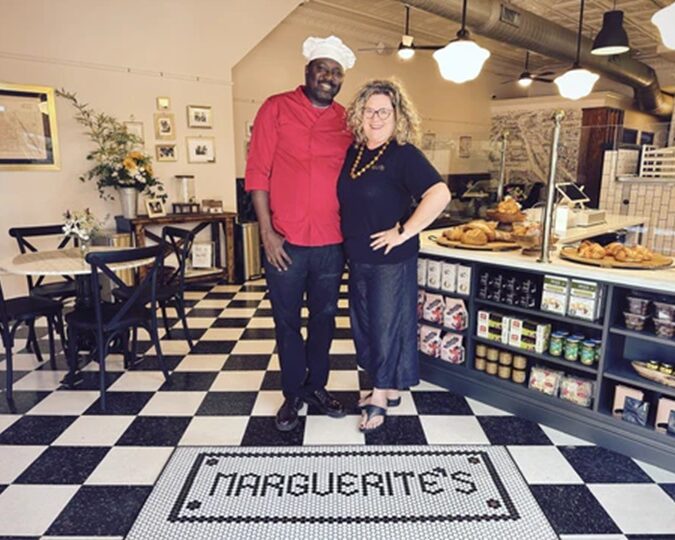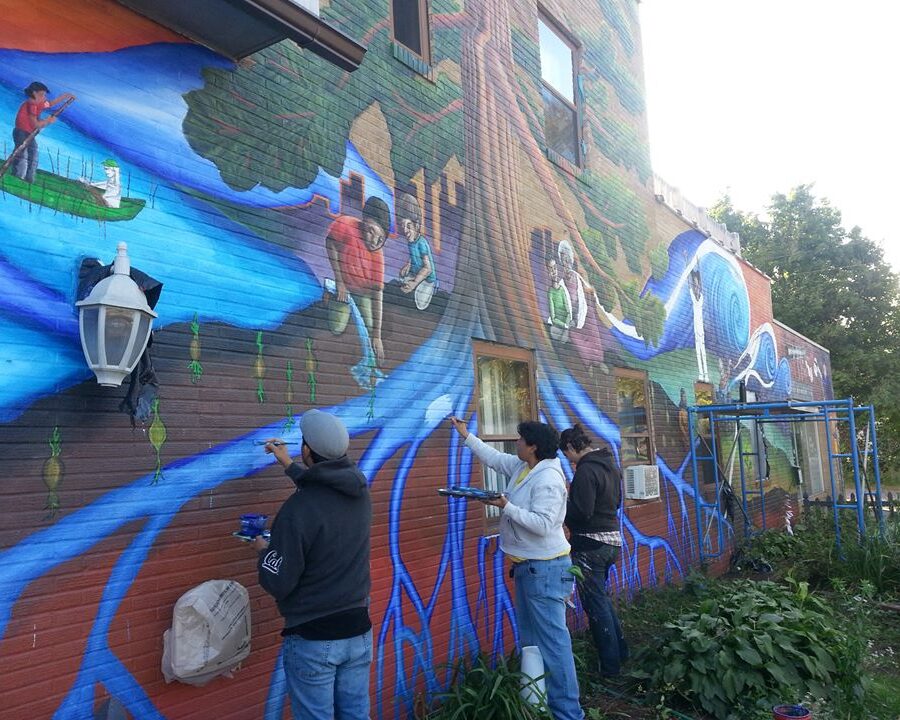 BY KAY SCHROVEN
BY KAY SCHROVEN
Sometimes out of tragedy something meaningful is rendered. This is how Soren Stevenson describes his brave decision to run for a seat on the City Council representing the 8th Ward. Stevenson is running against Andrea Jenkins who has represented the ward since 2018 and has been City Council president since 2022.
On May 31, 2020, in the wake of the murder of George Floyd by former officers of the Minneapolis Police Department (MPD), Stevenson was injured during a civil protest at University Avenue and the on-ramp for I-35W. He was shot by a kinetic impact projectile (aka a nonlethal weapon/rubber bullet) by a Minneapolis police officer and lost his left eye. This experience led him to re-examine his city, himself and how he might contribute to what he views as an obvious need for change. Stevenson seeks to bring meaning to his experience by contributing to the well-being of the city and its residents. He views his injury as a call to action for transformational change.
Stevenson seeks a “kinder, safer Minneapolis” with priorities on safety, police accountability, affordable housing and the climate crisis. His background is in nonprofit, affordable housing. He would like to see Minneapolis implement a strong rent control program with tenants having the opportunity to purchase. Mayor Frey has said that he would veto a 3% cap (as St. Paul has) on residential rent increases which leaves Minneapolis without rent control.
Jenkins favors “rent stabilization.” She describes this as a program offering subsidized rent to those who qualify, similar to Universal Basic Income (UBI) programs currently in place in a number of U.S. cities and on a pilot run in Minneapolis from 2022 t0 2024. UBI programs are social welfare programs that are government sponsored and designed to fight poverty by providing a monthly economic boost to those who qualify. “We need to provide aid to our most vulnerable,” says Jenkins, who points out that the most vulnerable are often women of color who reside in particular zip codes/neighborhoods such as the East Phillips neighborhood. Jenkins cites two additional Minneapolis programs that align with tackling poverty, Strive and Stable Homes-Stable Schools.
Regarding 38th and Chicago (George Floyd Square) as well as the unoccupied 3rd Precinct building at Minnehaha Avenue and Lake Street, it is Stevenson’s view that the communities around these locations have not been heard. “The city is not listening; until they listen it is difficult to move forward,” Stevenson said. He points out that the two sites that have been identified as potentials for the new precinct are prescribed by city authorities and are “false choices.” One is the existing (burned) site and the other is a lot a few blocks away. The cost to build at the new site is estimated at about twice the cost of rebuilding at the Lake and Minnehaha site. Renovate or build? Stevenson would like to see additional options that honor the community’s concerns. While he aligns himself with some of the current City Council members, he does not believe the council has been effective in resolving the issues connected to these two sites.
Jenkins reports that she gets many calls, emails and texts from community members with many diverse opinions and ideas about the “cop shop” for the 3rd Precinct, including voices who want no police presence. She spoke of perhaps having several satellite sites in the 3rd Precinct rather than one major site. Regarding policing, Stevenson points out that the police union contract needs serious attention and revision. “It is anti-accountability,” he said. “This is one of the most important things we can do for our city.”
Jenkins definitely has a vision for 38th and Chicago Avenue. She said that recently while at the location she met women from Detroit and from Florida who came to George Floyd Square to be part of it. “It is a national landmark,” Jenkins said, “and we have an opportunity to do something important here.” Jenkins would like to see a permanent memorial that honors lives lost to police brutality and a call to end racism. She envisions a mini-Nicollet Mall without cars, pedestrian-friendly, with safe public transit, green spaces and good lighting. She’d like to see small businesses and affordable housing developed in the area. Jenkins is pleased to see businesses popping up including a clothing store, a smokehouse and an arts center. In addition, she believes 38th and Chicago should be a place of healing, providing multiple modalities such as massage, yoga and acupuncture. “Harm has been done and healing is much needed,” Jenkins said.
Stevenson supports the Urban Farm project for the Roof Depot site at 1860 E. 28th St., an established Superfund site since 2007 in the East Phillips neighborhood. The battle has gone on for years with the city, whose plan has been to build a public works facility which would house water and sewage systems and a large parking garage. The community activists of the East Phillips Neighborhood Institute (EPNI), a local nonprofit, have fought the city in favor of a community center with an urban farm, cooperatively owned businesses and affordable housing with the community’s unsheltered residents in mind. The site’s history of containing arsenic trioxide remains a key concern. As Stevenson and I discussed the injunction currently in place with respect to the property, news broke that the city is willing to sell the 7.6-acre property to EPNI if the group can secure funding of $16.7 million from the state Legislature. Sahan Journal reports: “This is a win for the land-back movement.” Jenkins points out that the city needs a water maintenance facility. “I would like to find middle ground on this project where we could meet both the community’s needs as well as the city’s,” Jenkins said. “Meeting the needs of both could provide training, jobs and support families if done right.”
Stevenson believes that the creation of the Minneapolis Behavioral Crisis Response (BCR) team is a step in the right direction but does not believe it is adequately supported. “It needs to be expanded,” he said. Secured through Canopy Mental Health and Consulting, this team provides crisis intervention and counseling. Stevenson notes the wide discrepancy in budgets for this team, with just $1,450,000 allocated versus the MPD’s $195 million budget. Stevenson is in favor of expanding the BCR staff and improving and increasing their resources, such as vehicles. “We need experts to address the issues of mental health, not cops; there needs to be a better balancing of these two groups,” he said. Jenkins points out that the BCR serviced more than 7,000 individuals in 2022 on multiple shifts, including weekends, providing intervention and de-escalation. She too sees a need for expansion of the program.
Jenkins expressed how honored she is to serve her city during these unprecedented times with major challenges related to the COVID-19 pandemic and civil upheaval after the murder of George Floyd. “We’ve been faced with pernicious issues that not only happen in Minneapolis but across the country, such as homelessness. There is a lack of faith in government and attacks on democracy,” Jenkins said. She is proud of her work on the council including the introduction of the Department of Safety, the Avivo affordable housing development, the 2040 Plan designed to increase housing options, advances in reproductive health care and more, saying that she looks forward to making additional contributions. Jenkins believes that progress has been made in Minneapolis and that the new, enforceable consent decree between the state and the city will aid accountability of the MPD, “but it will take time, especially with the continuing shortage of officers.”
























